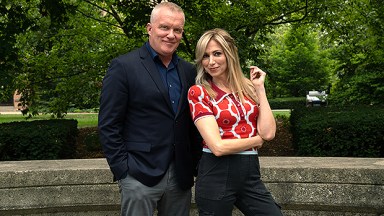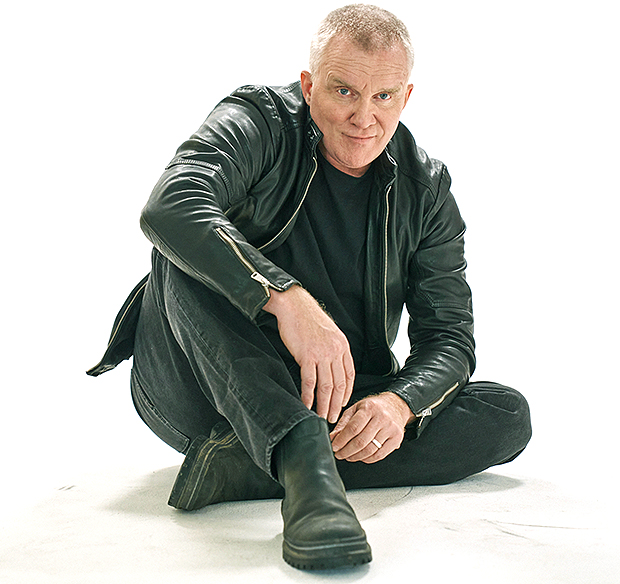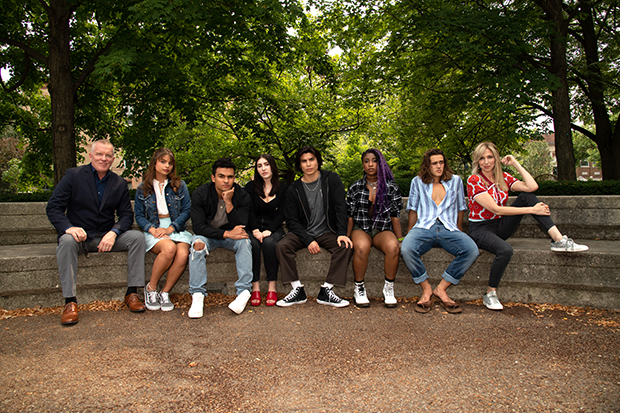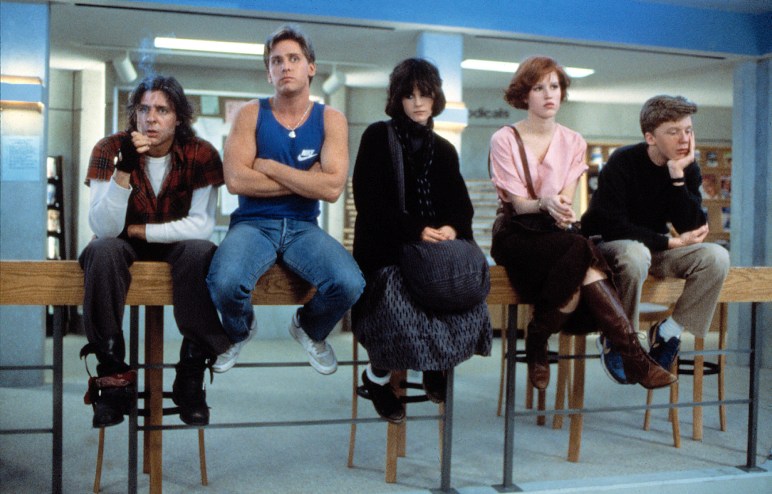
Anthony Michael Hall is heading back to high school… sort of. The actor and producer, who rose to fame in hit ’80s teen movies like The Breakfast Club and Sixteen Candles, is paying homage to the films that kickstarted his career with The Class. The coming-of-age indie drama follows a group of high school students who have to spend a Saturday together to complete a failed or missed exam. The Class is an homage to The Breakfast Club but is modernized to keep it relevant to today’s Gen Z teens.

HollywoodLife spoke EXCLUSIVELY with the actor about taking on a very different role in The Class than Brian Johnson in The Breakfast Club. He discussed working amongst of group of talented young actors who bonded on and off the set of The Class. Hall also discussed the possibility of a Breakfast Club reunion. Read our Q&A below.
I am a huge fan of your career, a huge fan of the ’80s movies, that the whole era. How did you react when you first learned of The Class and saw the script for the first time?
Anthony Michael Hall: It just took me by surprise. I was connected with Nick [Nicholas Celozzi] by an associate of mine who works with me, and it led to some great discussions. I read his screenplay, and I was really just shocked. I had no expectation of doing a film obviously inspired by another film I had already made, so it kind of took me by surprise, to answer your question. But I was really taken and really impressed by the quality of his writing. It was completely original, as you know, but it’s certainly inspired by The Breakfast Club. I thought, in this case, we have 6 students instead of 5, but I just thought all of the real-world issues that they’re dealing with are very dynamic and very interesting. I thought Nicky did a great job in terms of modernizing those aspects of it to kind of raise the stakes for the kids and all the stuff that they’re dealing with. All those issues are perennial. They’ve always been around. But I think in the context of film, certainly we didn’t go that far all those years ago, so I was really impressed at the quality of the writing. There was great conflict. It has great character development and great characters. The challenges that they’re dealing with made it very compelling and interesting, but he also had that humor.
That was another thing that, as producers, we wanted to make sure that we have those moments of cathartic release where people could lighten up and laugh. I thought that combination of elements in the screenplay was great. It was just a great surprise, and the way it shaped up was wonderful. We all went to Chicago, which is where Nicky’s from and that was surreal in a way for me to go back to Chicago because I made all these films there. It was shot at this university called Elmhurst University in suburban Chicago. It was just a great experience. We did the film in about 5 weeks, but we also got together and rehearsed. All the young actors really bonded at that point. They really became friends through the film, which was great, and that really fit their performances too. It was just a really nice surprise all around for all those reasons.
I love that the cast got time to rehearse because that is something similar to what you did with The Breakfast Club. That rehearsal time was so important to how everything fleshed out on screen.
Anthony Michael Hall: In our talks, I explained to them, look, this is one of the things that John was great at, his sense of collaboration, and then it really developed because he would carve out that time for us. Even on the comedies like when we did Sixteen Candles or even Weird Science, he was big on getting together, carving out the time to really rehearse. During that time, he’s also benefitting too because it allows him to start blocking the scenes in his mind, sometimes he would bring the DP in, etc. So Nicky did the same thing. He gave us that time to rehearse. We’d all get together at our hotel. We got together and blocked and rehearsed actually at the school where we shot. I thought that was really instrumental because it helped us bond as a group, as people. It helped all the actors. Nicky and I would just smile. They spent so much time with each other. They were really there for each other and really became each other’s support group as it develops in the script. As much as I love my fellow Breakfast Club members, we were close and we were friends, but this experience transcended that because they really became friends. The six of them were really there for each other on and off camera, which was wonderful. It was wonderful to see.
You’re one of the producers, but was it always set in stone for you to appear in the film? What led to your role?
Anthony Michael Hall: He wanted me to play Faulk, and then just in order for me to move forward, I said, “Look, I want to produce this with you as well.” That’s an exciting thing for me, too. I just wrapped another film. My company, which is Manhattan Films, co-produced it. It’s nice to see this development in my own career at 54. This is the first project that I’m a producer on, and I couldn’t be prouder of it because these young actors were amazing. They had such soul, they had such integrity, and no false moments, really, in the script. It’s really interesting just to see that from this younger generation, which is wonderful because I think in many ways, this younger generation is more conscious of others. That’s reflected certainly in the work because they were super cool with each other. They really rallied around each other and genuinely spent so much time together. That only fed the work. We had a great time.

So many of the themes in The Breakfast Club are universal, but the world is very different than it was 40 years old. It’s important to recognize these universal things but also find yourself in the current time-space.
Anthony Michael Hall: I couldn’t agree more. It was there. Nicky was great about giving them all space as humans, as young adults. It was like, we’re going to be creating this film, but let’s really do the work. From rehearsal to production all the way through was great because everybody was completely invested. It was really inspiring for me to see a generation of actors really deliver and also their way of… as I said, there were no false moments. They were really kind of just on point, all of them, because they had almost a self-directing sense. We didn’t want these false moments. We didn’t want to be corny. We really wanted to make it legit real. I also have to give credit to Debbie [Gibson], who is wonderful. Debbie’s obviously been around a long time as a singer, but she’s got a great heart, and it really shines through in the film. I think she’s very likable and very natural in her performance.
It’s also interesting because of the arc of my character Faulk and Miranda, her character because ultimately they have to become more invested. Whereas in the original film, as much as I love Paul Gleason, it was a little caricature in terms of how he played it. It was a little heightened in terms of his reality. I think with this, you see a different arc where you see Faulk really kind of soften at the end of the film. He’s really taken by them being so upfront and honest with their emotions and their life challenges, etc. But then there’s that nice arc because you get the sense that Faulk, and this is something that actually evolved, maybe he never left his area. Maybe he’s one of these people that just stayed where he was from, and maybe he had musical aspirations to be a musician or guitar player or a singer because it’s alluded to, and then it goes full circle because he then is forced to tell Hannah to keep the guitar. You’ve got real talent. Keep working on it. And then in turn, Debbie’s character goes through this nice metamorphosis as well because the kids forced her to share her story, and then Nicky has all that great backstory for her work. You get the sense that she was abandoned as a girl and that affected her decision-making in becoming a teacher. There are all these kind of really nice kind of humanistic touches to those characters, which I think even takes it further as well for the characters that Debbie and I play, which was a nice touch.
As you said, this film was inspired by elements of The Breakfast Club. We live in an era of reboots and revivals, but Hollywood hasn’t touched The Breakfast Club. Why do you think that Hollywood hasn’t touched The Breakfast Club just outright and remade it?
Anthony Michael Hall: That’s an interesting question. I don’t know. I know that the IP does belong to Universal. They were in partnership with John [Hughes] at that point in his career, but I don’t know. I don’t know the answer to that question. But I can tell you this… I’ve had obviously decades to think about what is the cultural impact of that film. I think that at its core, to me, it’s a sort of deconstruction of stereotypes, and then the overarching theme of the film is powerful, which is we’re all more alike than we are different. I think that what happens when people watch that film, or at least I’ve noticed this, it’s almost like conscious or unconscious projection kicks in where it’s almost like group therapy. People watch it and they’re like, oh, I can identify with that character. Or I had the combination of character traits of a few of the characters or what have you. I think that’s really interesting, too, that people kind of process that film almost at a therapeutic level because it reminds them of their upbringing or their childhood or challenges. I think that’s one of the things that was great about John. It’s a testament to his writing. All those little details of life and becoming an adult as you’re a kid were not lost on him. He considered them holy. He considered those transitions important, and you see that in the work and the writing.
But also, even if it’s something like the chyron at the beginning of The Breakfast Club that Bowie quote, that was all John Hughes. In the scene when [John] Kapelos is talking to Paul Gleason about how he wanted to be John Lennon when he was growing up as a kid, that was John Hughes. He loved The Beatles, but he loves John Lennon. John would always say this thing to me, “You’ve got to write about what you know.” He really walked the walk. All these little aspects of his life kind of bleed through in the work, and that was something that he encouraged. But I hope I answered your question, but I think that it’s interesting. I don’t know why it hasn’t been remade, but I’ve had time to process the effect of the film. And so with that as inspiration, I think Nicky did a beautiful job in terms of making this a modern-day, sort of inspired-by, homage retelling.
Have you ever thought about doing a reunion, just like on television like Friends or Fresh Prince of Bel-Air? I would love to see you all together again.
Anthony Michael Hall: We haven’t had that discussion. I don’t know if I should share this with you, but I will because I think it’s kind of funny. We recently got on a thread together, all of us, and it was actually regarding some rights issues because a lot of products popped up with our image on it as the Club and all those things. We were kind of recently reunited over that matter, so we’re all kind of communicating via email about whether or not we should litigate with a certain company. That being said, an actual reunion? The only time that came up was unfortunately John passed in 2010. We were all invited to the Oscars, and they gave a beautiful tribute to John. A lot of us were part of that, but it wasn’t The Breakfast Club specifically. It was Ally [Sheedy], Molly [Ringwald], Judd [Nelson], and I, but it also included Macaulay [Culkin], Matthew Broderick, and some others. You know, I’d be game for it. I would be open to it. Listen, it’s something that’s had impact, and it lives in the hearts of people. So I mean, I’m open to something like that. Emilio [Estevez] wouldn’t be because he doesn’t really work as an actor anymore, so I think he’s a little more reticent about that kind of stuff. But anyway, that was the last time we kind of got together and that was to pay tribute to John. I thought that was especially meaningful because, honestly, comedies are typically not acknowledged as much at the Oscars. You know what I mean? I thought that was a really nice, wonderful tribute to him.

We touched a little bit with this earlier about John Hughes’ rehearsal process with The Breakfast Club and Susannah Gora’s book that you’re quoted in actually really dove a lot into the rehearsal process, the script input that you guys had, etc. Just having that just one of a kind experience as a young actor, how did that experience shape you into the actor and producer and just person that you are today?
Anthony Michael Hall: I think that’s a great point. I think it really opened my eyes up to everything: what production was about, how to be a humble and cool leader because he [John Hughes] really was, how to collaborate because I thought one of his great talents was that he did open it up to us. He was not precious about his words, even though they were great. We all had good characters and all had good dialogue. What he did was he had that spirit of collaboration, so he was always accessible with respect to discussing the dynamics of the dialogue whenever they would come up. At the same time, he had a sense like clay. He would open it up and allow it to morph into something else. We would do it the way John wanted for two or three or four takes, and then if we wanted to play, he would encourage that as well. That was a wonderful talent that I think he had as well, not just his writing and his directing, but he was just cool. He also had an incredible ear for music.
When I went to visit his wife and his kids at their house, his writing room was amazing. He literally had a desktop and the rest of the room was filled with records, literally floor to ceiling all the way and on the floor everywhere. He was always writing with music in mind, which is how his signature ability to kind of put the right song in a scene developed because he was always integrating those cues into the scripts. He was a great collaborator. He understood music, and he was able to integrate all these things into his work at the same time and encourage us all to go that much further. He absolutely opened me up to the industry and the potential of doing things I think the right way and that spirit of collaboration, which is crucial.
The Class is now open in select theaters. It’s also available to rent/purchase on all major digital platforms.


